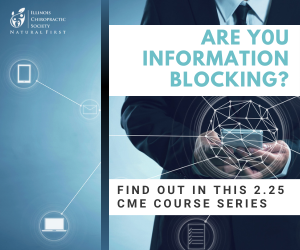
Fighting Improper Reviews

The following is provided as general educational information only, for you and your office. The Illinois Chiropractic Society and Dr. Boileve do not provide legal advice, and this information is not intended as such. Please contact your attorney regarding specific legal questions applicable to you and your practice.
It’s Monday morning, you had a great weekend, and you are ready for a fantastic week. The mail comes and you notice an envelope from a utilization review company. You get your coffee and you open the envelope.
Upon opening it, you begin to read the review was performed on your patient who was injured on the job. As you read the review, you notice that you were approved for only 6 visits and that your documentation did not show any functional improvement. Worse yet, the Anesthesiologist reviewer states that your documentation was clinically limited, even though you performed Outcomes Assessments every 6 visits, and properly documented each and every visit. The rest of the services rendered were considered “non-certified.”
Now what?
Oh yes, did I forget to mention that the review was performed by an Anesthesiologist? How many of you would simply put aside and accept this review? How many of you would not do anything and consider it as another workers’ comp case gone bad? How many of you wished they knew what do to fight this review tooth and nail?
In this article, I will discuss your options for fighting this type of review. Let’s begin with the following Illinois Supreme Court case, which can be found at: http://www.ecases.us/case/ill/2240551/dolan-v-galluzzo:
DOLAN v. GALLUZZO
NO. 51204.
77 Ill.2d 279 (1979)
396 N.E.2d 13
ROBERT J. DOLAN, Appellant, v. M.A. GALLUZZO, Appellee.
Supreme Court of Illinois.
Opinion filed October 19, 1979.
The plaintiff brought a malpractice action against the defendant, a licensed podiatrist (Ill. Rev. Stat. 1973, ch. 91, par. 73 et seq.), for an allegedly negligent osteotomy (surgical cutting of a bone) performed on his left foot in 1974. The plaintiff also alleged the defendant failed to obtain his informed consent because the defendant had not indicated the possible complications of the osteotomy. Upon learning of the plaintiff’s intention of having orthopedic surgeons testify and aware of significant disagreement between them and podiatrists, the defendant moved in limine to exclude all testimony by physicians and surgeons. The circuit court, after denying the first motion in limine and acting upon the second, ordered the plaintiff not to present “the testimony of any physician and surgeon for the purpose of proving” the standard of care a podiatrist owes a patient, or for the purpose of demonstrating that the failure of the defendant to inform the plaintiff “of the reasonable [sic] foreseeable risks of the procedure * * * was or was not consistent with the standard of care owed by a podiatrist to a patient.”
Because the State has “long recognized podiatrists as a separate and distinct profession of healers who are severely limited in their practice and whose educational requirements are substantially different than those of physicians,”
[77 Ill.2d 282]
and because “the treatments utilized by the podiatric profession * * * are substantially different from those utilized by physicians and orthopedic surgeons” (a view in which the plaintiff and defendant concur), the appellate court concluded the “defendant has the right to have his competence judged by the standards of his own distinct profession and not by those of any other.” (62 Ill.App.3d 832, 836.)
In summary:
We, therefore, hold that, in order to testify as an expert on the standard of care in a given school of medicine, the witness must be licensed therein. [emphasis added]
Although this ruling pertains to testimony in a podiatric malpractice case, it also holds true that most opinions rendered in the healthcare field must be by a similarly licensed professional expert/reviewer who practices under the same standards of care. It is important to be aware of this requirement.
All reviewers who review cases in the State of Illinois must abide by the URAC (Utilization Review Accreditation Commission) Standards and Guidelines. The Illinois Department of Insurance has made those standards available at: http://insurance.illinois.gov/URO/URACHealthUMv60.pdf. The definitions and rules are excerpted (with slight modifications) from the DOI site as follows:
A Health Utilization Management Standards, Version 6.0, URAC
Definitions:
Evidence-based:
Recommendations based on valid scientific outcomes research, preferably research that has been published in peer reviewed scientific journals. Evidence-based information can be used to develop protocols, pathways, standards of care or clinical practice guidelines and related educational materials.
Evidence-Based Medicine:
“Evidence-based medicine is the conscientious, explicit and judicious use of current best evidence in making decisions about the care of individual patients.” David L. Sackett, William M. C. Rosenberg, J.A. Muir Gray, R. Brian Haynes, W. Scott Richardson. Evidence-based medicine: what it is and what it isn’t. British Medical Journal 1996; 312:71-72. Reproduced with permission from BMJ Publishing Group.
Peer-to-Peer Conversation:
A request by telephone for additional review of a utilization management determination not to certify, performed by the peer reviewer who reviewed the original decision, based on submission of additional information or a peer-to-peer discussion.
Reviewer(s):
The individual (or individuals) selected by the organization to consider a case. Selection of the reviewer(s) for a case must be conducted in accordance with standards IR 1 and IR 6. All reviewer(s)who are health care practitioners must have the following qualifications:
- Active licensure;
- Recent experience or familiarity with current body of knowledge and medical practice;
- At least 5 years experience providing health care;
- If the reviewer is an M.D. or D.O., board certification by a medical specialty board approved by the American Board of Medical Specialties or the American Osteopathic Association.
- If the reviewer is a D.P.M., board certification by the American Board of Podiatric Surgery
Utilization Management (UM):
Evaluation of the medical necessity, appropriateness, and efficiency of use of health care services, procedures, and facilities. UM encompasses prospective, concurrent and retrospective review in which clinical criteria are applied to a request. UM is sometimes called “utilization review.”
URAC 6.0 (Applicable in Illinois)
Initial Clinical Review
(Note that references to provisions as “mandatory” or “not mandatory” refer to qualifications required by URAC for accreditation as a reviewer.)
HUM – 10 – Initial Clinical Reviewer Qualifications
Individuals who conduct initial clinical review:
(a) Are appropriate health professionals; and (Mandatory)
(b) Possess an active professional relevant license. (Mandatory)
HUM – 11 – Initial Clinical Reviewer Resources
Individuals who conduct initial clinical review have access to consultation with a: (not mandatory but given weight as promoting quality)
(a) Licensed doctor of medicine or doctor of osteopathic medicine; or
(b) Licensed health professional in the same licensure category as the ordering provider; or
(c) Health professional with the same clinical education as the ordering provider in clinical specialties where licensure is not issued.
Peer Clinical Review
HUM – 13 – Peer Clinical Review Cases
The organization conducts peer clinical reviews for all cases where a certification is not issued through initial clinical review or initial screening. (Mandatory)
HUM – 14 – Peer Clinical Reviewer Qualifications
Individuals who conduct peer clinical review:
(a) Are appropriate health professionals; (Mandatory)
(b) Are qualified, as determined by the medical director or clinical director, to render a clinical opinion about the medical condition, procedures, and treatment under review; and (Mandatory)
(c) Hold a current and valid license: (Mandatory)
- In the same licensure category as the ordering provider [emphasis added]; or
- As a doctor of medicine or doctor of osteopathic medicine.
Peer-to-Peer Conversation
HUM – 15 – Peer-to-Peer Conversation Availability
Health professionals that conduct peer clinical review are available to discuss review determinations with attending physicians or other ordering providers. (not mandatory but given great weight as promoting quality)
HUM – 16 – Peer-to-Peer Conversation Alternate
When a determination is made to issue a non-certification and no peer-to-peer conversation has occurred:
(a) The organization provides, within one business day of a request by the attending physician or ordering provider, the opportunity to discuss the non-certification decision: (not mandatory but given great weight as promoting quality)
- With the clinical peer reviewer making the initial determination; or
- With a different clinical peer, if the original clinical peer reviewer cannot be available within one business day); and
(b) If a peer-to-peer conversation or review of additional information does not result in a certification, the organization informs the provider and consumer of the right to initiate an appeal and the procedure to do so.
I realize it’s much to read, but well worth it. Understand the 1979 Illinois Supreme Court ruling of Dolan v. Galluzzo and the Illinois URAC rules. Note that the URAC rules require only an “appropriate health care professional” for the initial review. Often these reviews are conducted by an R.N. However, you will see that in almost all medical necessity reviews beyond the initial stage, the reviewer must be a licensed Doctor of Chiropractic. Additionally, in my opinion, the Doctor of Chiropractic should be licensed in Illinois and fully knowledgeable about the Illinois Medical Practice Act.
Armed with this information, you can argue that the reviewer is not qualified on chiropractic standards of practice and that the review is null and void when performed by anyone other than a Doctor of Chiropractic. I would also argue that, even during the initial review in which an “appropriate health care professional” is required, the only appropriate health care professional in a chiropractic case is a Doctor of Chiropractic. The State of Illinois Department of Insurance will enforce URAC requirements and will require a new review for any case that is not in compliance with URAC standards.
Incidentally, the case mentioned where the review was performed by an Anesthesiologist was mine. I argued my point with the adjuster and then the R.N. of the utilization review company. At first they stated that I was wrong. This was even after I made the arguments outlined above. But incredibly, just prior to submitting a written rebuttal, I was called 3 days later for a peer-to-peer review with a DC. Overall, all my treatment was approved. So, it pays, no pun intended, to know the information that helps you in your rebuttal of a review as performed by a non-DC.
With your Workers’ Comp patients, do your Outcome Assessment Tests every 6 visits. With your Personal Injury patients, do your Outcome Assessment Tests every re-exam or 12 visits. OATs are an integral part of Evidenced Based Medicine. Of course, this is in addition to your proper documentation noting medical necessity for care.
Know this material. Use it and get paid!!
Dr. CM Boileve is a Certified Insurance Consultant/Reviewer and a Certified Medical Compliance Specialist. He is available to assist you with compliance matters and insurance review rebuttals.



















